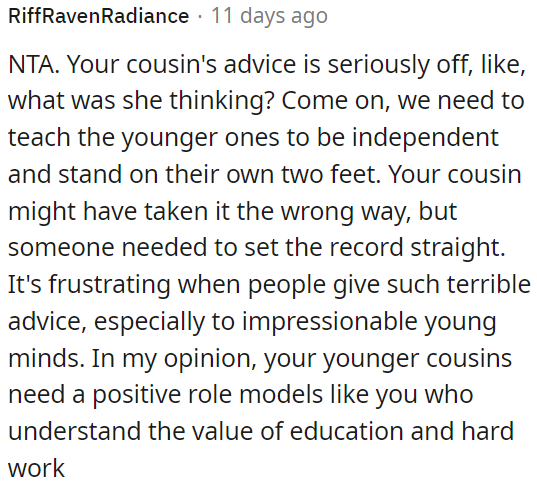Woman Calls Out Rich Cousin Over Giving Bad Advice To Younger Cousins, Saying They Can't All Be Like Her And Marry Rich
"You should date a smart boy so you don't have to worry about rent later."

In a world where financial independence and career aspirations form the cornerstone of our identities, the journey of one individual can stir up a whirlpool of emotions and opinions within a family. OP's cousin, a 26-year-old woman, had never held a job due to being financially supported by her wealthy father for most of her life.
After college, her boyfriend took over the financial responsibilities, even gifting her dream car for her birthday, which made her ecstatic. Despite her privileged upbringing, OP's cousin was known for her down-to-earth personality, according to family members.
However, after receiving the luxurious gift from her boyfriend, she began offering unsolicited financial advice to younger cousins, suggesting they should seek out wealthy partners to avoid financial worries in the future. Concerned about this advice, OP intervened, emphasizing the importance of financial independence and not relying solely on a partner's wealth.
This led to a heated argument, with OP's cousin interpreting her comments as an attack on her boyfriend and her character. The disagreement escalated when OP mentioned that not all girls have the same opportunities, leading to accusations of insults towards their cousins' appearances.
Despite later admitting her mistake in giving such advice, OP's cousin still believed that OP was in the wrong for her approach. In light of these events, OP questioned whether she was in the wrong for intervening and sparking the argument.
OP's cousin, who never worked due to parental support and then her boyfriend paying bills, received her dream car as a birthday gift from her boyfriend.

She has always been kind to OP's family, and despite her privileged upbringing, she's been down-to-earth, but recently gave financial advice to OP's younger cousins after receiving a car for her birthday.

She suggested that her smart boyfriend from high school was her best decision, emphasizing his future success despite his family's financial challenges.

But OP advised girls not to date boys based on their family's income to avoid financial responsibility as adults.

She felt insulted when OP mentioned her father's help in her boyfriend's success and the situation escalated.

OP's cousin admitted she shouldn't have criticized the girls' focus on studying, but despite her acknowledgment, she still believes OP was in the wrong.

She misunderstood OP's comments.
 Reddit
RedditOP's cousin is a gold digger.
 Reddit
RedditPrioritizing job skills over material possessions is important, and life goals shouldn't be limited to finding a partner.
 Reddit
RedditHaving family wealth provides a safety net, but marrying for security can be risky.
 Reddit
RedditOP should discussed her viewpoint with her cousin instead of criticizing her directly.
 Reddit
RedditOP's cousin is out of touch if she believes every "smart boy" can afford such a lifestyle in today's economy.
 Reddit
Reddit
OP's cousin might have misunderstood, but it's important to correct misconceptions.
 Reddit
Reddit
OP's cousin's financial dependence on her partner is risky.
 Reddit
Reddit
There was a big misunderstanding between OP and her cousin. OP was trying to say it's important for people to stand on their own two feet financially and not rely too much on someone else's money, especially a partner's. But her cousin took it the wrong way and got defensive.
What's concerning is that OP's cousin thinks it's the best thing to find a rich partner to take care of you, which isn't a healthy way to think. It's important to focus on building your own career and life goals, not just finding someone with money.
OP could have handled it better by talking things out calmly instead of jumping straight into criticism. Also, it's not realistic for everyone to find a partner who can afford to spoil them like OP's cousin's boyfriend does.
In the end, it's risky for OP's cousin to rely completely on her partner for money. Everyone should work on being independent and not counting on someone else to provide for them all the time.
Expert Opinion
Refusing to share an inheritance may reflect personal boundaries or past family conflict. It's not always selfish - sometimes, it's about self-respect. Refusing to share an inheritance may reflect personal boundaries or past family conflict. It's not always selfish - sometimes, it's about self-respect.
How we reviewed this article:
We strive to provide accurate and helpful information in every story. To ensure transparency and credibility, we've referenced reputable sources that help support the context or claims made in this article.
-
• Mayo Clinic. (n.d.):https://www.mayoclinic.org/
-
• Psychology Today. (2023):https://www.psychologytoday.com/us
-
• American Psychological Association. (2022):https://www.apa.org/news/
-
• Smith, L. (2023). "When family and money collide." Journal of Family Psychology:https://www.mayoclinic.org/
-
• Center for Financial Wellness. (n.d.):https://financialwellness.org/
